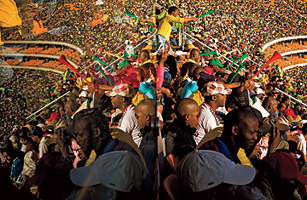
Fans watch two local teams battle in the first match at Johannesburg's newly completed Soccer City Stadium.
Two of the most godforsaken soccer pitches in the world are on Robben Island, a flat rock battered by Antarctic winds and icy waves in the southern Atlantic, 6 miles (about 10 km) off Cape Town on the tip of Africa. The island's isolation made it a natural prison for British colonists, who kept their enemies there, including the warrior-prophet Makana, who drowned trying to escape in 1820. In the 1960s, the island became apartheid's Alcatraz for 2,000 prisoners, among them Nelson Mandela, who served 18 of his 27 years in jail there. Repressive regimes often mistake fastidious procedure for legitimacy, and under Robben Island's rules, the chief warden had to meet the inmates once a week to hear their grievances. For three years, beginning in late December 1964, the men united around a single demand: the right to play soccer.
In 1967 the warden finally allowed a 30-minute kick-about every Saturday. The prisoners responded by setting up two pitches on the sandy ground outside their cells and — going way beyond mere exercise to create a sophisticated institution with both real and symbolic weight — set up a 24-team league run strictly according to FIFA regulations by the newly inaugurated Makana Football Association.
The prisoners understood that under apartheid, soccer was revolutionary. Player skill disproved the idea that blacks were physically inferior; meticulous administration did the same for mental ability. The game was based on fair play, the sporting equivalent of human rights. Chuck Korr, the University of Missouri sports-history professor who co-wrote More Than Just a Game, about the Robben Island soccer league, says Makana's internal structures — "fair, equitable and based upon the twin ideals of justice and democracy" — became a school for South Africa's future leaders. Evidence for that can be found on Makana's old team sheets, a virtual roll call of South Africa's leading politicians, judges and tycoons — including President Jacob Zuma, then an imposing central defender. But if soccer on Robben Island helped prisoners forge a future, it was also indispensable to them in the present. Through the long night of apartheid, a civil weekend game was how the prisoners preserved their dignity.
Today, South Africa is holding another soccer tournament, and the rebel spirit of Robben Island will resonate at every match. South Africans are no longer fighting a ruling regime but a ruling perception. For much of the world, Africa remains the hopeless continent, a place of war, famine and babies with flies in their eyes. Its richest nation, and the World Cup host, is known for some of the worst levels of violent crime on earth, a global record HIV/AIDS population of 5.7 million out of 49 million and the kind of poverty that accompanies an unemployment rate of 35.4%. On that view, staging the world's premier sports and television event in Africa is unfathomable folly. Just last January, British newspapers wrote off the World Cup as "a disaster" (Daily Mirror) and a dream "in tatters" (Daily Telegraph).
To Africans, such doubts can seem like ignorance and prejudice. Because the truth is that Africa is changing. It is still home to catastrophes like Somalia and the Democratic Republic of Congo. But if you take its 48 nations together, foreign investment is now double that of aid, democracy is beating back dictatorships, and economic growth is robust. Similarly, while free South Africa has often turned out to be less admirable than the man who led it there, crime is falling, antiretroviral drugs are widely available, and water, electricity and good roads are widespread. There is a persistent racial economic divide, but it is fading, as millions of middle-class black South Africans and a new black elite can attest.
Just as soccer was a game changer on Robben Island, South Africa wants the World Cup to be one for it and for Africa. "It's to show the world that we are capable," President Zuma tells TIME. Danny Jordaan, head of South Africa's organizing committee, agrees. "If we can deliver the World Cup," he says, "we will have finally dismissed the idea created by apartheid that there are greater and lesser human beings. We will be ready to take our place in the world."
Africa's Game
From the outside, Soccer City — on the eastern edge of Soweto, where the first and final games of this year's World Cup will be played — looks like a vast calabash, an African cooking bowl. Inside, the architecture is more politicized. The pitch sinks into the ground and, surrounded by tiers of 94,000 seats, resembles an open cast mine. The players' tunnel is a replica of a mine shaft. This is not a paean to the industry whose gold sustained apartheid; it is a memorial to the black labor on which white racism relied. On May 3, in a nod to how things have changed, Jordaan thanked the new generation of workers who built South Africa's World Cup venues by giving out 54,000 match tickets, two to each. "The world can see what you have built," he said. "This is not just a stadium but a monument, a demonstration of this country's ability and capability."